“Be as I am – a reluctant enthusiast…a part-time crusader, a half-hearted fanatic. Save the other half of yourselves and your lives for pleasure and adventure. It is not enough to fight for the land; it is even more important to enjoy it.”
I first heard of Edward Abbey when I met a rather raffish guide in Alaska who recommended the novel, The Monkey Wrench Gang.
I ended up reading Abbey’s novel, and what I found therein was the presence of a man with whom I felt a sincere kinship. I was enraptured by Abbey’s spirit of rebellion, irreverent wit, and appreciation for the simple and subtle beauty of the natural world.
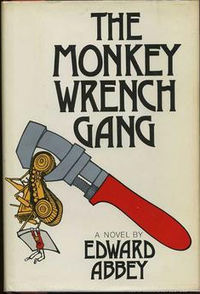 The Monkey Wrench Gang is a delightful romp that I’d recommend to anyone, but here I wish to discuss a different chunk of words from Abbey. The following passage is taken from a speech that Abbey delivered to environmentalists in Missoula, Montana and Colorado, circa 1976:
The Monkey Wrench Gang is a delightful romp that I’d recommend to anyone, but here I wish to discuss a different chunk of words from Abbey. The following passage is taken from a speech that Abbey delivered to environmentalists in Missoula, Montana and Colorado, circa 1976:
“One final paragraph of advice: do not burn yourselves out. Be as I am – a reluctant enthusiast…a part-time crusader, a half-hearted fanatic. Save the other half of yourselves and your lives for pleasure and adventure. It is not enough to fight for the land; it is even more important to enjoy it. While you can. While it’s still here. So get out there and hunt and fish and mess around with your friends, ramble out yonder and explore the forests, climb the mountains, bag the peaks, run the rivers, breathe deep of that yet sweet and lucid air, sit quietly for a while and contemplate the precious stillness, the lovely, mysterious, and awesome space. Enjoy yourselves, keep your brain in your head and your head firmly attached to the body, the body active and alive, and I promise you this much; I promise you this one sweet victory over our enemies, over those desk-bound men and women with their hearts in a safe deposit box, and their eyes hypnotized by desk calculators. I promise you this; You will outlive the bastards.”
This quote is particularly savory to my mental muscle in that I feel it distills several prime components of Abbey’s approach to life (based on my knowledge of him) into a single potent bit of exposition.
Support and Fight for What You Love, What You Value
The Gandhi-ism “be the change” is a sort of omnipresent bit of “inspiration” that lacks much of its original force due to overuse, but I’ll risk incorporating it here to suggest that Edward Abbey genuinely exemplified this mantra. Abbey was a lifelong environmental activist and fierce advocate for the preservation of our natural spaces. From his anarchist political views to his controversial fiction writing, Abbey was a symbol of environmental preservation and independent thought.
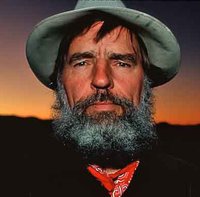
The late Edward Abbey. Image via Wiki Commons.
Furthermore, in all that he did, Abbey brought his flavor of spunk and sauciness, supporting what he loved as an original personality rather than a generic patron. Note the zinger: “I promise you this; You will outlive the bastards.” That’s quintessential Abbey—cursing and probably offending people. While some might scoff at him or brand him a derisive rabble-rouser, I admire his unapologetic honesty, his willingness to say what he felt.
I tend to feel that supporting and/or protecting what one loves is a promising avenue to finding zeal and a sense of purpose in life. By extension, I think we can all snatch a proverbial page from Abbey’s book. We do not have to be prolific philosophers or fiery debaters to act in support of a cause.
If we want to protect the environment, we might simply adopt a more sustainable lifestyle or share online content to raise awareness. If we believe in art, we might start making some or promote and encourage the art of our friends. If we want to fight for human rights, we might first examine our own prejudices and start speaking up when people make discriminatory remarks.
I guess I’m suggesting that we can all find ways to live in support of what we feel is important, and that in doing so we might just enrich our interior worlds. Whether we realize it or not, the way we’re living is supporting many ideas and entities, and if we don’t consider that this is taking place, we might be indirectly assisting some dastardly shit.
But Don’t Become Consumed by the Cause
This is the primary message of Abbey’s quote. Support the cause, chase your aspirations, etc., but retain the ability to let it all slip away and enjoy yourself. Be the “part-time crusader”, the “half-hearted fanatic”.
Abbey implies that life is to be experienced and reveled in first and foremost, that if we become too obsessed with whatever fight we’re fighting we may forget to relish the many fine things in this world, to spend time with loved ones, or to simply relax. I’m reminded of a quote by the 19th century naturalist John Lubbock:
“Rest is not idleness, and to lie sometimes on the grass under trees on a summer’s day, listening to the murmur of the water, or watching the clouds float across the sky, is by no means a waste of time.”
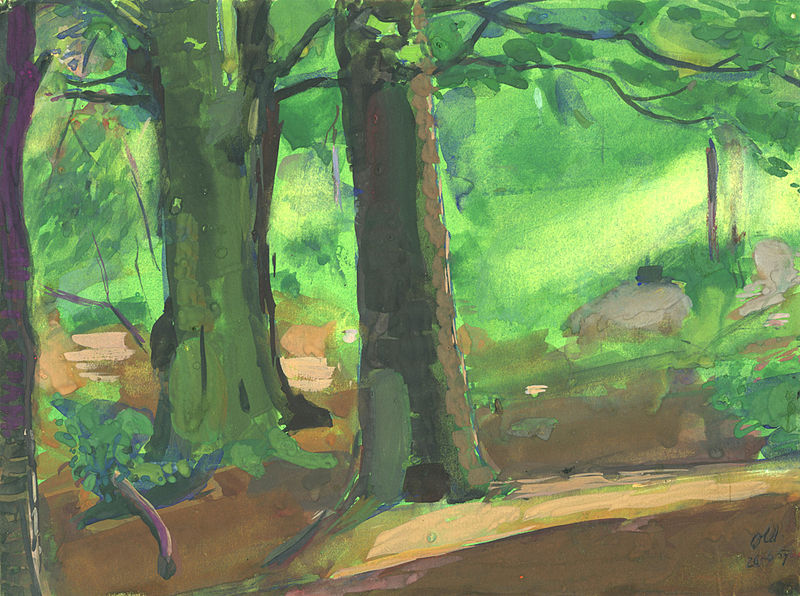
The woods at Cupid’s Green transformed into a jungle by Ashley George Old, 1959. Photo Credit: Wiki Commons
Cherish the Vitality and Peace Available in the Natural World
Finally, I wouldn’t talk about Abbey’s quote without noting his devotion to the natural world. Abbey was truly a frontier man, a believer in the precious silence, aesthetic wonders, and life-renewing qualities of the untamed wilderness.
Abbey’s passage reveals his undying allegiance to all things leafy, rocky, wooded, and ancient, as well as his (to put it mildly) distaste for what he perceives to be an apathetic civilization blindly swinging a machete at his sanctuary. Abbey felt that the lifestyle paradigms of modern societies were diminishing to the individual. He contrasted this with the simple joys of the wild terrain, which he deemed invigorating, nourishing, purifying.

The American Southwest was dear to Abbey’s heart. Image via Wolfgang Stoudt.
We should note that Abbey is far from alone in this conviction. In his book Last Child in the Woods, Richard Louv asserts the existence of a discrete epidemic, “nature-deficit disorder“, as he labels it. Louv employs various scientific studies to connect a lack of time spent outdoors with a variety of modern afflictions—ADHD, depression, anxiety, obesity, and boredom, name a few.
Of course countless naturalists also reside in Abbey’s camp. The great John Muir once wrote:
“Thousands of tired, nerve-shaken, over-civilized people are beginning to find out going to the mountains is going home; that wilderness is a necessity; and that mountain parks and reservations are useful not only as fountains of timber and irrigating rivers, but as fountains of life.”
A City-Dweller’s Thoughts
As someone who has been living in a Korean city of 8 million people for the last 4 months, I can relate to Abbey’s and Muir’s perspectives. Something about life seems fundamentally different when one cannot see the stars; when one spends all of one’s time upon concrete and steel, instead of soft ground; when one is constantly ejaculated upon (pardon the expression) by noisy advertisements and neon lights, instead of soothed by a forest’s soft hues.
This may sound overly romanticized, and perhaps it is, because it’s coming straight from the mind of a deprived and nostalgic nature-lover. What I’ve found to be both relieving and frightening is that you do adapt to life in the city. You get used to not seeing the stars. You start to forget about the lakes and the woods. You begin to embrace the fast-paced, overcrowded city life, and it changes you. It really does.
You begin to tune out its uglier aspects and focus on the ones that excite and stimulate you. There’s so much to do, after all. These cultural centers—they’re just hopping with people and entertainment and experiences. You can swim in it. But there’s also a certain repetition to it—a sort of ubiquitous landscape, an endless search for kicks, a hamster wheel of working tedious jobs and compensating for lost time by spending too much money.
It’s a curious thing, really. I’ve come to love living in the city, and I’m not going to judge whether a rustic lifestyle trumps an urban one, or vice versa. I do know one thing, though—I won’t allow myself to forget the calming expanses and crisp air of the original green-and-blue world that I adore. I won’t forget that it’s waiting for me, and come springtime, I’ll head for the mountains, humbly expecting to be restored in areas I did not realize I was depleted.
If you enjoyed this, consider grabbing free updates from Refine The Mind.
About Jordan Bates
Jordan Bates is a Lover of God, healer, mentor of leaders, writer, and music maker. The best way to keep up with his work is to join nearly 7,000 people who read his Substack newsletter.

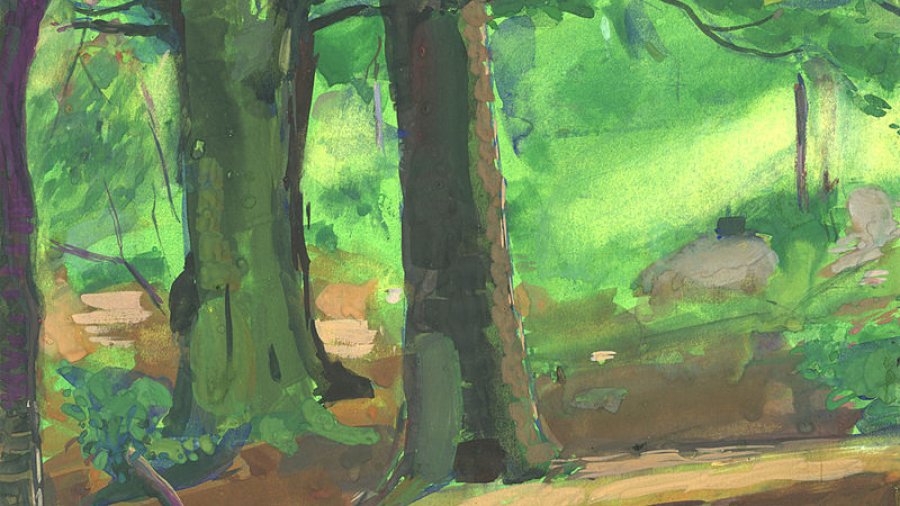

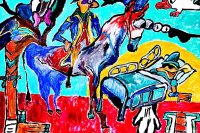

I love this. The quote by Abbey nearly brought me to tears because it captures so perfectly how I want to respond when people at work look at me sideways when I tell them I spent my vacation in a tent, rather than St. Barts. Of course, the irreverence and spunk are also delightful.
Glad you appreciated it, venus. 🙂
Abbey was an exceptional writer, and his words inspired me greatly as well. Glad I could share and write about him. Keep doing what you do. I’m envious of your tent!
Very beautiful. I needed this read!
Thanks, George! So glad you enjoyed it and found it to be necessary in some way. 🙂
Very good. Much wisdom in this there is.
Thanks, Yoda. 😉
As a long-time Abbey fan, I appreciate your added insights into his irascible character and his admonition that, in addition to being kinder to the planet, we should also be kinder to ourselves by spending more time in nature. An excellent essay. Thank you.
Happy I could write about him, snakeman. May he be remembered for generations to come. All the best to you.
Nice. It is so easy to get overwhelmed when the stakes are ever-higher in the battle against corporate destruction of the ecosphere. I’ve been reading more and more about working less and using less, living a life that does not require the sale of ones life in exchange for stuff. Alas, Aldo Leopold was also correct in his idea that in pursuing our beloved natural settings, we tend to do things that cause their destruction (e.g. roads into previously untouched wilderness, that admit people with RTV’s and beer cans). I find it painful to care, but impossible to not care.
Anywolf, I agree that the stakes are high and it’s easy to feel like we need to dedicate our entire lives to remedying the situation. But yes, I think using less and being the type of person who doesn’t contribute to the problem is a tremendous statement in itself. I hadn’t heard of Leopold, but after a brief Google search, he looks awesome and I’m going to read some of his essays. You’re right that all of our infrastructure inevitably leads to tainting the purity of the untouched wild. I hate finding trash in otherwise beautiful locations. Caring is painful… Read more »